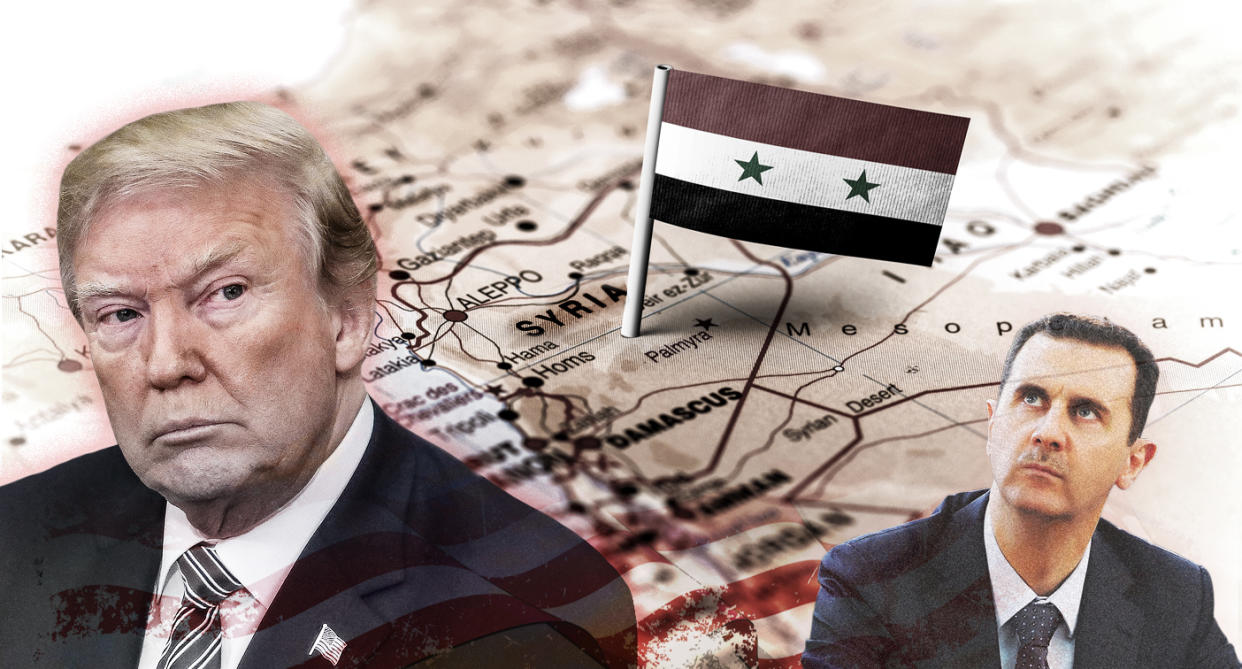Trump's incoherent, dangerous policy on Syria, as laid out in tweets

On Wednesday, a day of growing peril in a part of the world where Russian and American forces sometimes confront each other, the president who campaigned on never telegraphing his intensions to adversaries decided to taunt Russia with the threat of a missile attack. “Russia vows to shoot down any and all missiles fired at Syria,” President Trump tweeted Wednesday morning as an anxious world watched to see if the Syrian crisis will escalate out of control. “Get ready, Russia, because they will be coming, nice and new and ‘smart.’”
Russia vows to shoot down any and all missiles fired at Syria. Get ready Russia, because they will be coming, nice and new and “smart!” You shouldn’t be partners with a Gas Killing Animal who kills his people and enjoys it!
— Donald J. Trump (@realDonaldTrump) April 11, 2018
President Trump’s tweets fly in the face of the norms that even during the Cold War kept the two great nuclear powers from needlessly provoking each other. They risk further inflaming a conflict that has already drawn in regional and world powers in a dizzying nest of alignments. With the common enemy the Islamic State of Iraq and Syria (ISIS) on the brink of defeat, those opposing forces are increasingly coming into conflict as they jockey for position and territorial control inside Syria.
Just this year, U.S. forces in Syria have battled Russian mercenaries who attacked their base, reportedly at the direction of the Kremlin, and killed more than 100 of them. In northern Syria, U.S. troops and their Kurdish allies remain engaged in a tense face-off with the military forces of Turkey, a NATO ally. This week, Israeli warplanes attacked a military base in Syria, where Iran coordinates its militias, killing four Iranian military advisers.

This week’s suspected chemical weapons attack by Syrian forces, which reportedly killed more than 40 people in a rebel-held stronghold near Damascus, and President Trump’s telegraphed determination to respond militarily, have set the escalation cycle spinning even faster.
“The new normal is that President Trump uses Twitter as direct fire to convey his feelings and intent to audiences at home and abroad, bypassing the United States’ entire foreign policy and diplomatic apparatus. It’s now understood around the world that those tweets are a direct pipeline to his thinking, which is an unprecedented and significant development,” said retired Lt. Gen. David Barno, a former senior U.S. commander in Afghanistan, and currently the distinguished practitioner in residence at American University’s School of International Service.
In weighty matters of war, the president’s tweets may offer a direct conduit to the Trumpian id, but they are unfiltered by a careful calculation of U.S. interests and the risks involved, or by a strategy guiding the actions of a great power. Instead, Trump’s tweets and off-the-cuff pronouncements, Barno notes, reveal “a constant tension between U.S. military commanders who want to sustain a military presence in Syria to consolidate their gains from the defeat of ISIS, and a commander in chief who instinctively dislikes U.S. boots on the ground, but is willing to use bombs and missiles to achieve his goals. Those two ideas remain very much in tension in this administration, and I’m not sure that adds up to a strategy.”

In the wake of Trump’s recent dismissal of his secretary of state and national security adviser, the administration’s Syrian policy has devolved into incoherence. In January, then Secretary of State Rex Tillerson articulated a Syrian strategy that envisioned an indefinite U.S. military presence to achieve ambitious goals, including removing Syrian strongman Bashar Assad from power, returning millions of Syrian refugees to their homes, rolling back Iranian influence and securing Syrian chemical weapons.
On April 3, U.S. special presidential envoy Brett McGurk and U.S. Central Command chief Gen. Joseph Votel spoke at the U.S. Institute for Peace in Washington. They laid out a carefully crafted stabilization plan to return millions of displaced residents to their homes in territory in Iraq and Syria liberated from ISIS, to consolidate the military rollback of the extremists. “The hard part is still to come, which is stabilization, getting people back in their homes, consolidating our gains, and creating the conditions that will allow these things to happen,” said Votel.
Even as his top diplomat and general on Syria were laying out their stabilization plan, however, President Trump was telling reporters at the White House that he wanted U.S. troops out of Syria. The White House subsequently froze over $200 million in aid earmarked for stabilization in Syria by the State Department. “I want to get out, I want to bring the troops back home, I want to start rebuilding our nation,” Trump said at a White House news conference with leaders of the Baltic nations on April 3. Trump has reportedly told the Pentagon to withdraw the roughly 2,000 U.S. military troops in Syria in the next four to six months.
Photos: Deadly gas attack in rebel-held Douma, in Syria’s eastern Ghouta »
Retired Gen. Barry McCaffrey is a former commander of U.S. Southern Command, and a division commander in the 1991 Persian Gulf War. “We now have a White House in chaos, a president threatening missile strikes even as he blunders by mindlessly signaling that he wants U.S. troops out of Syria, and U.S. military commanders who lack a coherent strategy or realistic objectives learning about U.S. policy from the president’s tweets. So we’ve never seen a mess like this,” he said in an interview. If Trump carries through on his threats to launch missile strikes to enforce a so-called red line against Assad’s use of chemical weapons, as seems likely, McCaffrey believes the U.S. should hit hard to gain leverage in future negotiations over an eventual U.S. withdrawal from Syria. “Military power is a terrible tool for sending political signals, but if the Trump administration truly intends to send a signal, it should take out the Syrian air forces and as many of Assad’s generals as possible. That would signal to a lot of bad actors in Syria not to screw with us as we look for an exit.”
In reality neither the Obama nor the Trump administration has had a clear plan for a post-ISIS Syria. The defeat of the Islamic State is now in sight, as Assad and his Russian and Iranian allies are close to winning the civil war. Those seismic events have left the major players looking to consolidate their gains, and eyeing opposing forces suspiciously. The current status quo of U.S.-backed Kurdish forces holding territory in northern Syria near the Turkish border, and Iranian forces entrenched on bases in central and southern Syria, has also drawn the ire and military interventions of Turkey and Israel, respectively.

“The question of what happens the day after we defeat ISIS has been kicked down the road for a long time, and now the Trump administration is having to confront the really complex realities of that situation,” said Andrew Tabler, a Syrian expert and fellow in arab politics at the Washington Institute for Near East Policy. With the help of its Russian and Iranian allies the Syrian regime has all but defeated the rebellion, he noted, but that victory leaves Assad as “king of the rubble.”
“And two neighboring countries and U.S. allies find the outcome of the war unacceptable, and the interventions of Turkey and Israel threaten to turn the Syrian civil war into a wider regional war also involving Iran, Russia and the United States,” said Tabler. “So while Americans on both sides of the political aisle are war weary, the United States still has a significant interest in insuring that ISIS doesn’t reclaim safe havens in Syria from which to launch terror attacks on the West, and in preventing Iran from launching attacks on our ally Israel from Syria that could ignite an all-out regional war that impacts energy prices.”
In weighing those interests against the inherent risks involved, Trump administration officials will confront the reality that the long-standing U.S. position that “Assad must go” was never pursued with the same determination that Iran and Russia brought to their desire that he should stay. Syrian territory has long represented a critical land bridge between Iran and its chief Lebanese ally and proxy Hezbollah, and Damascus has been a key foothold in the Arab world for Moscow going back to the early years of the Cold War. The resulting disparity between the two sides’ willingness to expend resources and accept risks has hamstrung U.S. policy on Syria for years.

“Overthrowing Assad and replacing him with a better leader was always desirable, but as a goal it was always well beyond what the American people were willing to commit in blood and treasure,” said retired Ambassador James Dobbins, the former special representative for Afghanistan and Pakistan in the Obama administration, and a senior fellow at the Rand Corp. Instead the Trump administration should concede that Assad has won the civil war and offer to normalize relations and withdraw U.S. troops, Dobbins argues, based on two conditions: an offer of limited autonomy for Syrian Kurds in territory they now control, thus keeping faith with a key U.S. ally in the fight against ISIS, and the withdrawal of all foreign militias.
“At the moment, the Iranian militias and Hezbollah are key to Assad’s survival, but when the war is over he will want them to go home, which will go a long way toward addressing Israel’s concerns. I also think the United States can broker an accommodation between Turkey and the Syrian Kurds, just as we once did between Ankara and the Iraqi Kurds,” said Dobbins. “The wider point is that it’s time to take the politically unpalatable position of acknowledging that Assad has won, and try to make the best of a bad situation.”
A number of experts worry, however, that the conflicting signals and constant chaos emanating from the White House will undermine the deft diplomacy, complex messaging and military posturing needed to strike such a deal. The alternative is that the United States continues to lurch between a premature pullout from Syria that could leave a wider regional war in our wake, and a “shoot from the lip” bellicosity that risks miscalculation and conflict with a nuclear superpower.
“Rather than having a strategy driving our actions, we have a president who speaks and thinks in terms of applause lines and impulsive showmanship, and there is a price to be paid for that kind of strategic incoherence,” said Paul Pillar, a former senior CIA intelligence analyst specializing in the Near East and South Asia. “Our adversaries like the turmoil that messaging sows between the United States and our allies, who are constantly confused about who speaks for the administration, and what exactly to make of the president’s tweets.”

James Kitfield is senior fellow at the Center for the Study of the Presidency & Congress, and author of the recent book “Twilight Warriors: The Soldiers, Spies and Special Agents Who Are Revolutionizing the American Way of War” (Basic Books). He is a former senior correspondent for National Journal and has written about defense, national security and foreign policy issues from Washington, D.C., for more than two decades.
_____
Read more from Yahoo News:


